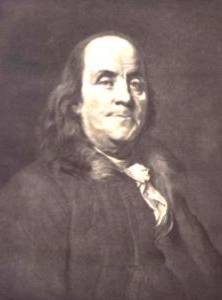| An
Enlightenment attempt to base religion on reason alone, concerned
with ethics; also called "natural religion." |
 |
|
Benjamin
Franklin, American founder and Deist
|
The humanism of Erasmus,
which prized simplicity and ethics, foreshadowed an Enlightenment attitude
toward religion. The Era of Reform ignited conflicts, such as the Thirty
Years' War, which made people desire that religion promote peace. Meanwhile
the rise of natural science, with its emphasis on rational systems, suggested
that religion also was a system. Deists saw Christianity as a religious
system originally based on the moral teachings of Jesus but now so encrusted
with superstition, doctrine, and hierarchy that it had ceased to function.
Doctrines, sacraments, hierarchy, and miracle were stripped away. Remaining
were the basic beliefs of Deism: 1) God exists and should be worshipped;
2) service to humanity is the best form of worship; 3) there is an afterlife
in which good will be rewarded and evil will be punished. John
Locke boiled it down even further: believe in Jesus and lead a moral
life. Among the mediating positions between Deism and traditional Christianity
is Unitarianism as articulated by William
Ellery Channing. Benjamin Franklin was perhaps the best-known American
Deist.
|